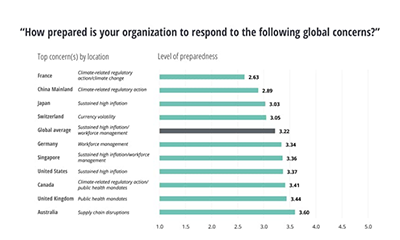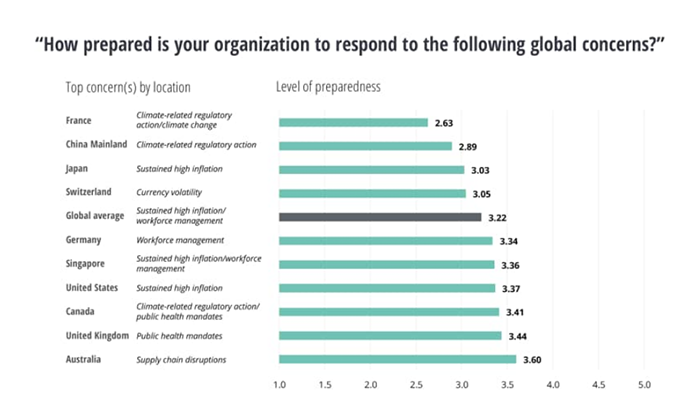
CRE Executives Worry About The Economy

Ongoing uncertainty in the global economy could affect commercial real estate even more than the pandemic did, said Deloitte, New York.
“In the near term, the potential for regional or global recession or stagnation looms–and these impacts would be felt across financial services sectors,” Deloitte said in its Commercial Real Estate Outlook.

Deloitte surveyed chief financial officers of commercial real estate owners and investors about their growth expectations, investment priorities and anticipated structural changes in the months to come. It said new concerns about revenue will prompt real estate leaders to reassess their strategies.
“Concerns about the economy are top of mind for most global real estate leaders as they prepare for the remainder of 2022 and 2023,” the report said, noting mixed revenue expectations for 2023–40% said they think revenues will increase, 48% see revenues decreasing and 12% said they expect no change. The results were much more pessimistic compared to one year ago, when 80% said they expected revenues to increase in 2022. As a result, one-third of people surveyed said they plan to cut costs compared to last year, when only 6% planned to make cuts.
“Respondents point to sustained high inflation, workforce management, cyber risk and climate-regulated regulatory action as issues that will have the most impact on revenues over the next 12 to 18 months,” Deloitte said. “Unfortunately, most respondents do not think the industry is fully prepared to respond to some uncertainties.”
Despite their near-term performance reservations, most respondents remain optimistic about real estate fundamentals, the report found. When it comes to cost of capital, capital availability, property prices, vacancy levels, leasing activity, transaction activity and rental rates, two-thirds of respondents said they expect improving or stable conditions for the next year. Respondents pointed to leasing activity, tightening vacancies and rental growth as variables with the most potential for improvement.
Deloitte said CRE firms will need to focus more on ESG disclosure requirements and addressing tax regulation trends as the regulatory environment heats up globally. The survey showed that real estate firms remain in the early stages of managing their ESG compliance requirements. Only 12% of respondents said they have prepared to immediately implement changes to meet new regulatory requirements and only 7% use ESG data and analytics in their investment strategy decision-making. Most plan to start incorporating ESG data over the next year to two years.
“Real estate companies will need to learn about potential regulatory changes and adopt practices to comply with reporting requirements,” the report said. It noted more than 45% of respondents said they await guidance or an industry-driven response and said industry associations can play a critical role by providing ESG observations, information and recommendations. “CRE leaders should also be sure to focus on more than just the ‘E’ in ESG–social and governance issues are also important,” Deloitte said.
